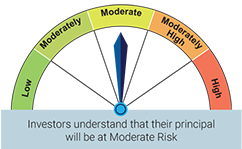Debt monthly view for April 2020
Posted On Tuesday, May 12, 2020
May 12, 2020
Quantum Fixed Income Team
It has been a tale of two cities in the Indian bond market. On the one hand the government bonds and a narrow segment of the AAA rated corporate bonds continue to attract investors. While on the other hand a large part of the corporate debt market is struggling to find buyer. An investment in debt funds typically has the following risks: (i) Liquidity risk, will I get my money back when I want it – is the portfolio that the debt fund owes tradeable?, (ii) Interest rate risk, how will the portfolio react to the changes in interest rates?, and (iii) credit risk, how safe are the companies in which the debt fund invests?
The corporate debt market has been under stress and was lacking liquidity since the bankruptcy of IL&FS in September 2018 and the continued economic slowdown. COVID-19 and the lockdown were the catalyst for the recent turmoil in credit markets.
Since the IL&FS bankruptcy, the RBI has been on the front foot trying to revive investors’ sentiment in the credit markets. The RBI has reduced interest rates to historic lows, flushed the banks with liquidity, relaxed various regulatory requirements on bank lending to stressed sectors like NBFCs and real estate and also provided cheap money to banks to buy corporate debt. But all these measures failed to have any material impact on the corporate debt market.
In the last month a large mutual fund house announced the winding down of 6 of its credit-focused, debt schemes stating ‘lack of liquidity in the market’ as a reason. This sent a shock wave to the entire community of debt mutual fund investors who, in panic, rushed to withdraw their investments from credit risk funds and many other debt mutual fund schemes.
This prompted the RBI to open up a special liquidity facility of Rs. 50,000 crore for mutual funds. Under this facility, the banks can avail of cheap funds from the RBI and lend to mutual funds against debt securities as collateral.
We view this liquidity window as a band aid. It could provide an interim relief to some fund houses but might not be enough to resolve the underlying problem in the credit market.
The financial system is currently dealing with extreme risk aversion. The extent of risk aversion can be seen in the fact that the banks are parking about Rs. 8 lakh crore of surplus liquidity in the RBI’s Revere Repo facility at the interest rate of 3.75% but are not willing to buy corporate bonds which are could offer much higher yields.
In our opinion things can get even worse in the corporate debt market before we see any kind of recovery. Remember, a large segment of the corporate India and households have lost their income during this lockdown. Even when the lockdown get lifted, things will take time to recover.
In this scenario it would be prudent for investors to avoid any kind of credit risk in their debt funds. Investors also need to understand that credit and liquidity risks are inherent characteristic of debt investments - though this is difficult to identify in normal times. The current crisis in the debt mutual funds is a direct outcome of ignoring these risks for a very long time.
The government and the RBI will have to find some way to intervene directly in the credit markets in order to restore smooth functioning of the financial markets. Additionally, the government will need to support the businesses and a large section of poor households to come out of the financial pain caused by the lockdown.
There is a broader expectation that the government will need to spend additional 3%-5% of GDP to support the economy. Though it would be of a great help for the economy, the bond markets are more worried about how the government will fund this kind of spending.
This remains a big uncertainty in government bond markets which kept the long maturity bond yields above 6% despite the overnight rate and the 3months treasury bills falling to ~3.5%. The 10-year benchmark government bond remained in a band of 6.0%-6.5% in the month of April.
Going ahead, the uncertainty about the economic impact of lockdown and the government policies will continue to affect the long term bonds while the shorter maturity bonds may benefit from the easy liquidity condition and potential rate cuts.
Overall we have turned even more cautious on the longer maturity bonds and have accordingly reduced the maturity profile of the Quantum Dynamic Bond Fund portfolio. However, we remain vigilant to the developments in the financial markets and policy response from authorities.
We advise investors in bond funds to keep the market risks in mind while trying to benefit from any further fall in bond yields. Investors with low risk appetite should stick to short maturity funds or Liquid Funds to avoid any sharp volatility in the value of their portfolio. However, while choosing such funds one should be aware of the credit risk. It is preferable, in our opinion, in invest in funds which take lower credit and liquidity risks.
Given the excess liquidity situation, which we expect to continue, returns from overnight and liquid funds will remain muted. However, in the current uncertain times, investors should live with lower returns and should prioritize safety and liquidity over returns.
We advise investors in bond funds to have a longer time frame - keeping in mind that, in the short term, returns from bond funds may be volatile and may also be negative.
Data Source: Bloomberg, RBI
| Name of the Scheme | This product is suitable for investors who are seeking* | Riskometer |
| Quantum Dynamic Bond Fund (An Open Ended Dynamic Debt Scheme Investing Across Duration) | • Regular income over short to medium term and capital appreciation • Investment in Debt / Money Market Instruments / Government Securities |  |
* Investors should consult their financial advisers if in doubt about whether the product is suitable for them.
Disclaimer, Statutory Details & Risk Factors:
The views expressed here in this article / video are for general information and reading purpose only and do not constitute any guidelines and recommendations on any course of action to be followed by the reader. Quantum AMC / Quantum Mutual Fund is not guaranteeing / offering / communicating any indicative yield on investments made in the scheme(s). The views are not meant to serve as a professional guide / investment advice / intended to be an offer or solicitation for the purchase or sale of any financial product or instrument or mutual fund units for the reader. The article has been prepared on the basis of publicly available information, internally developed data and other sources believed to be reliable. Whilst no action has been solicited based upon the information provided herein, due care has been taken to ensure that the facts are accurate and views given are fair and reasonable as on date. Readers of this article should rely on information/data arising out of their own investigations and advised to seek independent professional advice and arrive at an informed decision before making any investments.
Mutual fund investments are subject to market risks read all scheme related documents carefully.
Please visit – www.QuantumMF.com to read scheme specific risk factors. Investors in the Scheme(s) are not being offered a guaranteed or assured rate of return and there can be no assurance that the schemes objective will be achieved and the NAV of the scheme(s) may go up and down depending upon the factors and forces affecting securities market. Investment in mutual fund units involves investment risk such as trading volumes, settlement risk, liquidity risk, default risk including possible loss of capital. Past performance of the sponsor / AMC / Mutual Fund does not indicate the future performance of the Scheme(s). Statutory Details: Quantum Mutual Fund (the Fund) has been constituted as a Trust under the Indian Trusts Act, 1882. Sponsor: Quantum Advisors Private Limited. (liability of Sponsor limited to Rs. 1,00,000/-) Trustee: Quantum Trustee Company Private Limited. Investment Manager: Quantum Asset Management Company Private Limited. The Sponsor, Trustee and Investment Manager are incorporated under the Companies Act, 1956.
Related Posts
-

Debt Monthly for February 2026
Posted On Monday, Feb 02, 2026
In FYTD26, Indian bond yields defied expectations, firming up even as monetary policy turned supportive.
Read More -

Debt Monthly for January 2026
Posted On Thursday, Jan 01, 2026
Navigating 2026: India’s Bond Market in a Changing Global Landscape
Read More -

Debt Monthly for September 2025
Posted On Friday, Sep 05, 2025
August in the Indian bond market was nothing short of chaotic, with constant surprises and swings.
Read More



